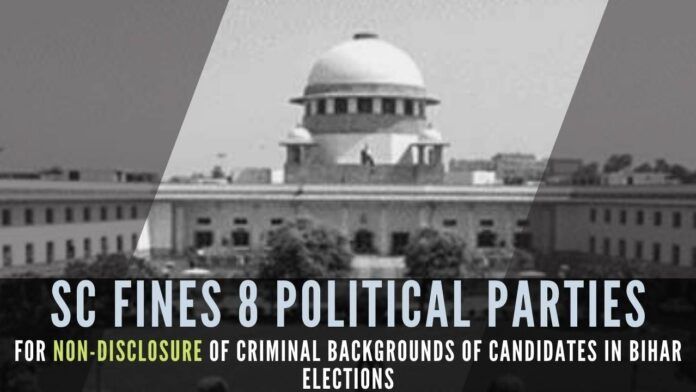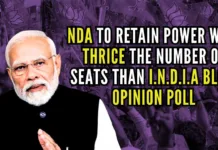
SC fines 8 political parties for non-disclosure of criminal backgrounds of candidates in Bihar Elections
In a rarest of rare development, the Supreme Court (SC) on Tuesday imposed fines on eight political parties for failing to comply with the directions in relation to the disclosure of details of candidates with criminal backgrounds on their official websites as well as in newspapers and on social media in the Bihar Assembly Elections. CPI(M) and NCP were fined Rs.5 lakh each and BJP, Congress, RJD, JDU, CPI, and LJP were fined Rs. one lakh each by the Bench comprising Justices Rohinton Nariman and B R Gavai. CPI(M) and NCP were fined high due to the total non-compliance with the apex court’s directions.
“We direct the Respondent Nos. 3,4,5,6,7 and 11 to deposit an amount of INR 1 Lakh each in the account created by the ECI as specified in this judgment in paragraph 73(iii) within a period of 8 weeks from the date of this judgment. Insofar as Respondent Nos. 8 and 9 are concerned, since they have not at all complied with the directions issued by this Court, we direct them to deposit an amount of INR 5 Lakh each in the aforesaid account within the aforesaid period,” the Court ordered.
SC, however, refused to state that oversight on part of the State Committee of the party cannot be a ground for non-compliance of the directions passed by the Court.
The Court delivered judgment on contempt petitions filed by Brajesh Singh and Manish Kumar, who alleged that the Court’s earlier directions passed on February 13, 2020, were not complied with by political parties during the Bihar Assembly Elections. Senior Advocate K V Viswanathan served as Amicus Curiae in the case.
Senior Advocate P V Surendranath, appearing on behalf of CPI(M) submitted that the election process for the State of Bihar was coordinated by the State Committee of the party and that Form C7 and C8 were not submitted due to oversight on part of the State Committee. He further submitted that the party has attempted to comply with the directions of this Court insofar as a declaration of information regarding criminal cases in newspapers and the website of the party is concerned and that the aforementioned act of non-compliance should be viewed as an isolated incident and its unconditional apology be accepted.[1]
The Court, however, refused to state that oversight on part of the State Committee of the party cannot be a ground for non-compliance of the directions passed by the Court. NCP submitted that its State committee was dissolved few months prior to the election and that was the reason for non-compliance. The Court, however, declined to accept the same and held it to be guilty of contempt of court.
BJP contended that criminal antecedents were published in newspapers that are of low circulation and that the forms in which details of criminal antecedents have to be published have been filled in a mechanical manner. The Amicus Curiae pointed out that the party provided reasons for the selection of candidates, by referring to serious offences such as offences under Section 386 of the Indian Penal Code and Section 506 of the Indian Penal Code and portraying them as cases that were of a trivial nature.
“We are of the view that the reason given by the party for failing to submit Form C-7 in respect of one of its candidates is not acceptable and that the party has not provided reasons for selection of its candidates which are in line with our directions,” the Court said holding the party guilty of contempt of court. Amicus Curiae pointed out that RJD specifically provided ‘winnability’ as the only reason for the selection of its candidates against those without criminal antecedents.
The Amicus Curiae in his report said JDU filed Form C1 and C2, which specifies the format for publication of criminal antecedents of candidates by the candidates and political parties respectively in newspapers, in a vague and mechanical manner. The petitioners pointed out that criminal antecedents of Congress candidates were published in newspapers that are of low circulation and that the forms in which details of criminal antecedents have to be published have been filled in a mechanical manner.
References:
[1] [BREAKING] Supreme Court fines 8 political parties for non-disclosure of criminal antecedents of candidates in Bihar Assembly Elections – Aug 10, 2021, Bar and Bench
- NIA confiscates Pak-harboured Khalistani terrorist Lakhbir Singh Rode’s key aide’s land in Moga - April 19, 2024
- Prime Minister Narendra Modi: A Gujju businessman who does not invest his precious time for a losing battle - April 13, 2024
- NIA arrests two accused Shazib and Taahaa in Bengaluru’s Rameshwaram Cafe blast case from Kolkata - April 12, 2024










